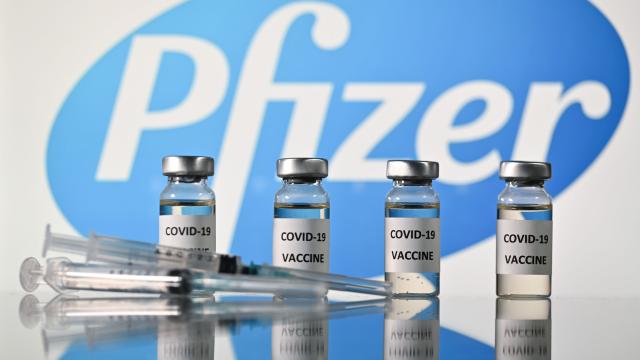On Friday morning, Pfizer and BioNTech announced that they would be seeking an emergency use authorisation from the U.S. Food and Drug Administration today for their jointly developed covid-19 vaccine. If granted, that would make this vaccine likely the first to reach the public in the U.S., followed closely by Moderna’s candidate. But what exactly happens next, and how soon can anyone expect to have access to either of these vaccines?
Emergency use authorisations (EUAs) are routinely used for drugs and other treatments in times of crisis, including during this pandemic. But the situation here is largely unprecedented, since only one vaccine in the U.S. has ever gone through the EUA process before, and that was under far different circumstances. In 2005, the FDA granted the emergency use of an anthrax vaccine to U.S. soldiers who may have been at greater risk of bioterror attacks involving weaponised anthrax powder. But the vaccine had first been approved in the 1970s as protection against skin infections caused by the bacteria. Even still, the decision didn’t come without some controversy over whether the vaccine would be as effective against inhaled anthrax.
Prior to the release of Pfizer and Moderna’s preliminary results in mid-November, some experts expressed concerns about whether the FDA should even grant an EUA instead of letting the vaccines go through the standard process. One worry is that giving companies a EUA could lead them to end their ongoing clinical trials early, depriving scientists of crucial long-term data.
Earlier this week, Pfizer announced that it completed the primary goal of its trial: testing whether the first 170 participants to be diagnosed with covid-19 were more likely to have received the vaccine or a placebo. Both Pfizer’s and Moderna’s results have suggested that their vaccines are highly effective at preventing symptomatic illness from the coronavirus. But there are other questions, such as how long this immunity will last, that can be only answered by continuing to study people over the next two years, as originally planned.
Another concern is that people will choose not to enroll in future vaccine trials of other experimental candidates, instead opting for those already granted emergency use. Conversely, people might not want to get a vaccine that they fear was unsafely rushed out or that later turns out to have serious side effects not seen in the early data.
These potential problems will have to be weighed against the benefits of a highly effective vaccine. The country is in the middle of a raging pandemic with no clear end in sight. Though the initial supply of vaccines will be limited, this supply is likely enough to cover the millions of health care workers who will be some of the first in line to receive them.
As for what’s next, the FDA has already scheduled December 8-10 for an advisory committee of independent experts to evaluate data from any potential vaccine candidates. These committees provide recommendations on whether a treatment should win approval from the FDA, and though their advice isn’t binding, the FDA rarely disagrees with their verdict.
Potential new vaccines aren’t only evaluated by the FDA. The Advisory Committee on Immunization Practices (ACIP), run out of the U.S. Centers for Disease Control and Prevention and similarly stocked with independent experts, also plays a part. Their recommendations guide how vaccines will be given out to the public, such as recommending that only people above a certain age should be eligible for one. Usually, their guidelines also dictate the potential out-of-pocket costs for a vaccine that could be covered by insurance, but both the outgoing Trump and incoming Biden administrations have promised that any approved covid-19 vaccines will be provided free of charge.
The ACIP is scheduled to meet on November 23, which will only be a preliminary meeting to discuss how they’ll evaluate any future covid-19 vaccines. It’s likely that the ACIP will then next convene right around the time the FDA is holding its meetings.
These meetings will probably provide the first opportunities for most outside experts to see the trial data collected so far by Pfizer and Moderna. While there had been concerns that a vaccine could have been rushed out prior to the election for political reasons, the FDA took added steps last month to ensure that any approved vaccines would have to meet strict safety standards — a move that earned plenty of scorn from Trump and other administration toadies. That should somewhat reassure anyone worried that the FDA wants to unduly rush ahead with a vaccine.
Whatever ends up happening, it’s important to remember that a vaccine for most of us is still far off. Pfizer has said that it will start mass vaccine production within hours of receiving FDA approval. But it has only pledged to produce around 25 million doses for the U.S. by the end of the year, which amounts to 12.5 million uses of the two-dose vaccine (the company has pledged another 25 million doses to other countries, including Australia, Canada, and the UK). Moderna has said it will have 20 million doses of its own two-dose vaccine by the end of 2020.
These doses would be prioritised for high-risk groups, such as health care workers and possibly the elderly. Pfizer will also still have to work out how to deploy its vaccine everywhere, since it requires extreme cold temperatures for storage; Moderna’s vaccine is said to require only standard refrigeration. For the general U.S. public, it’s almost certain that they’ll will have to wait until late summer/early autumn before any vaccines might widely available.
So, although this is all shaping up to be good news, we’re still going to need to hunker down and keep each other safe.
